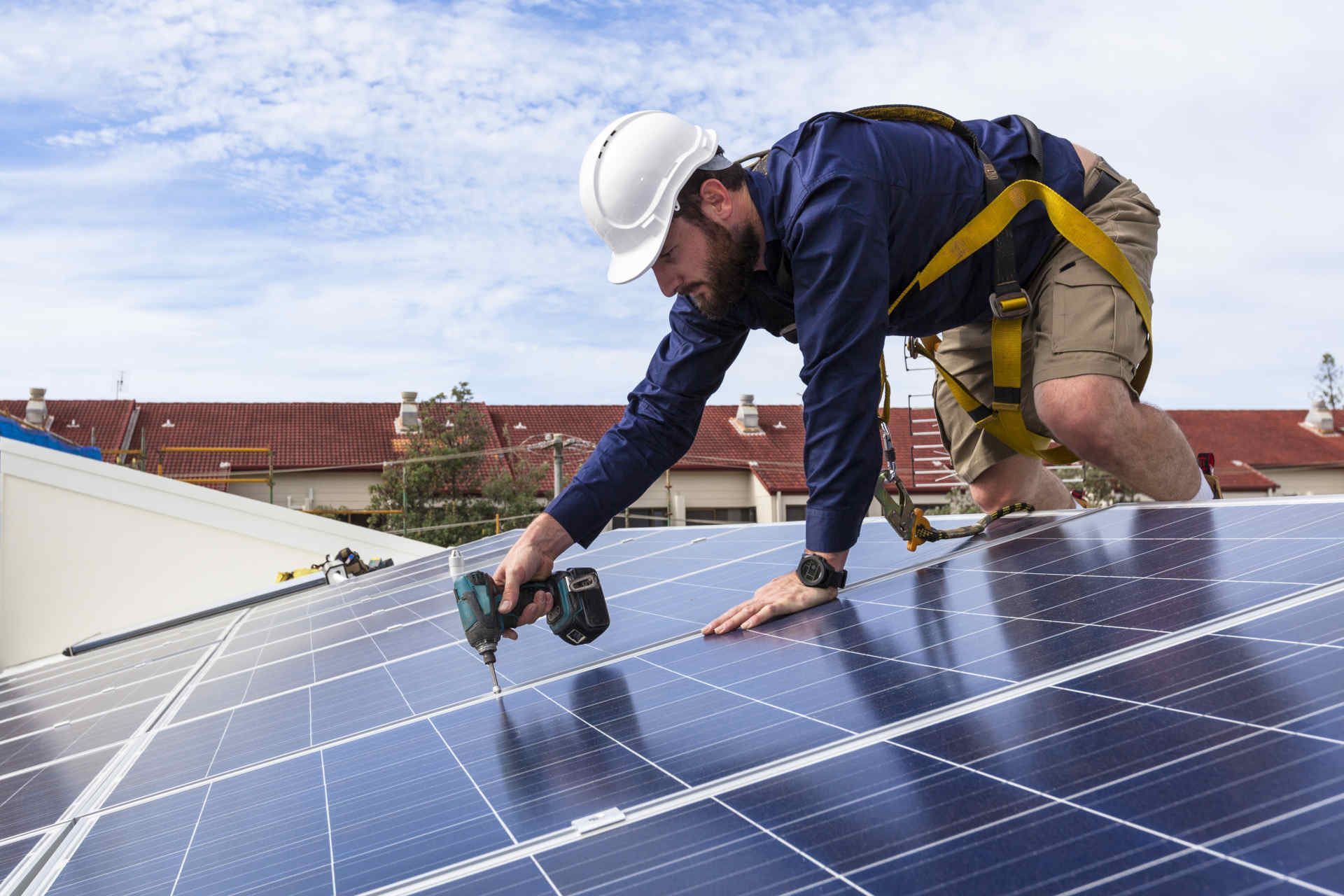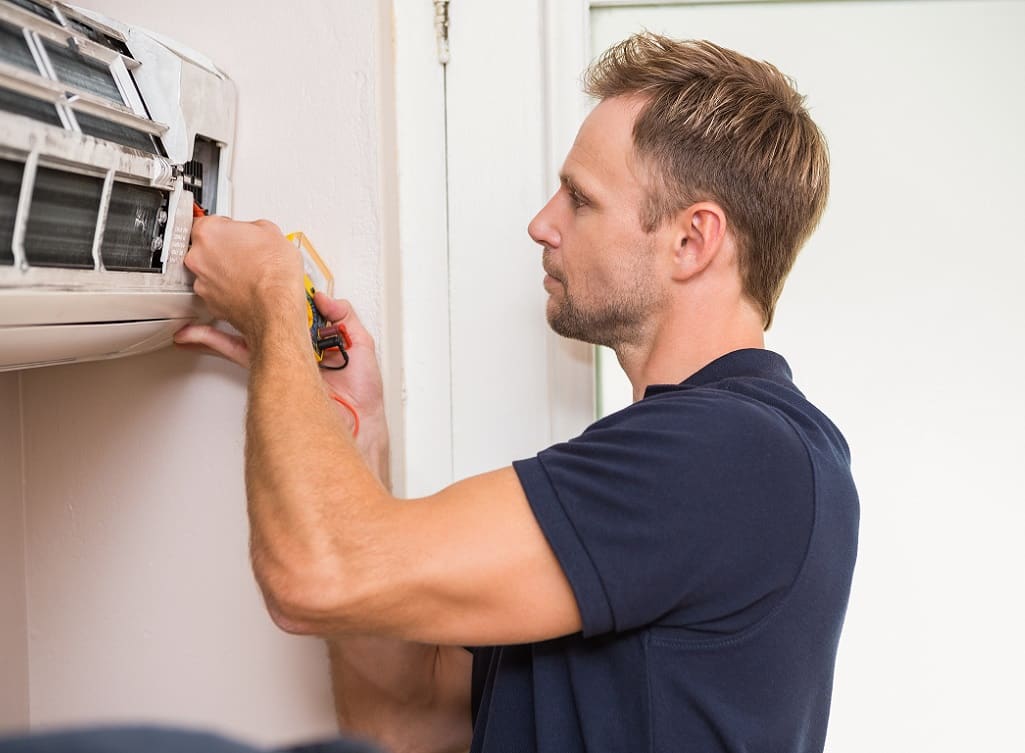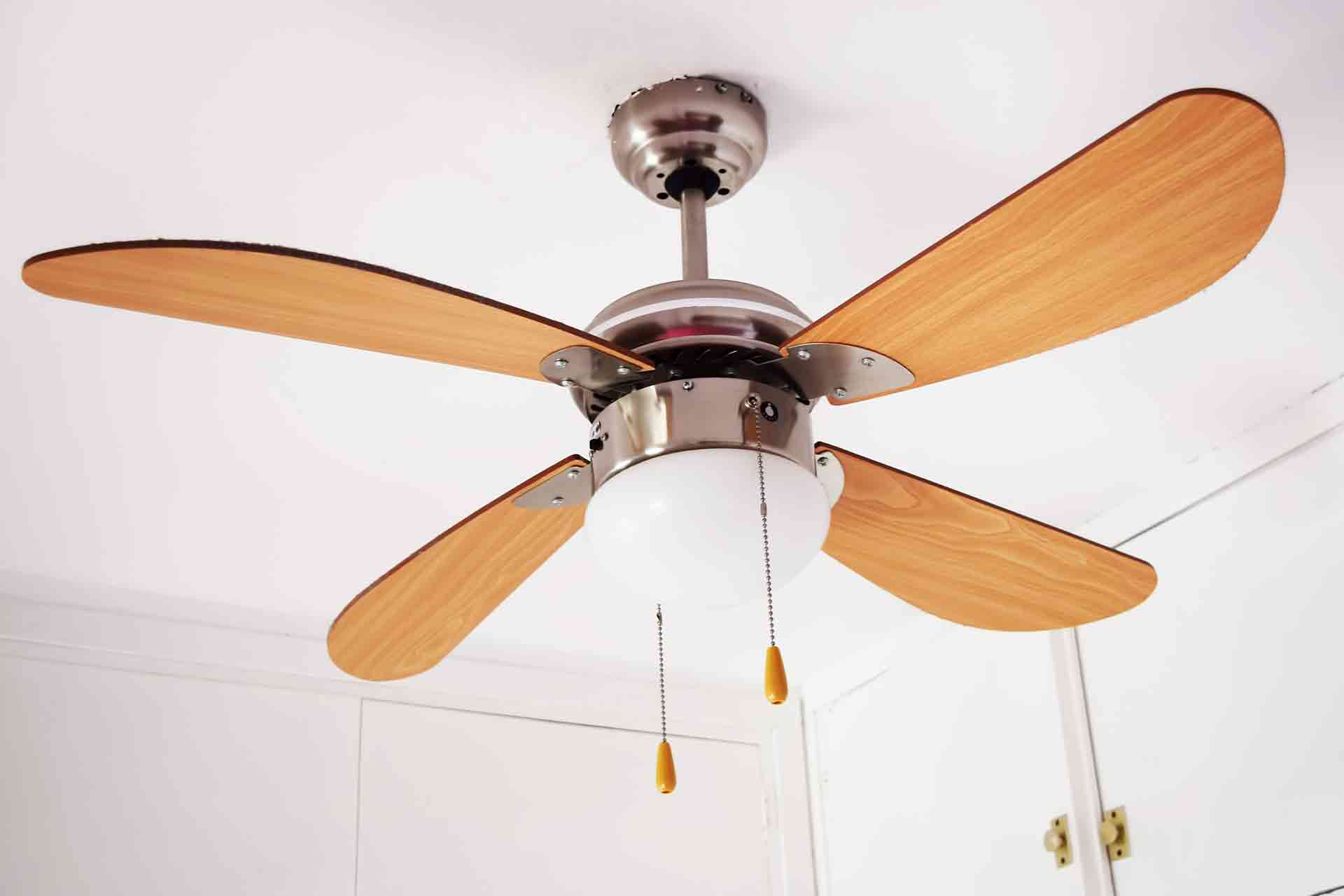Blog>Expert Advice>Air conditioning: Everything you need to know
Last updated: 4 June 2024
Air conditioning: Everything you need to know
With summer temperatures affecting our sleep and working from home becoming more prominent, now is a great time to invest in an air conditioning unit.

This guide will cover areas such as what is air conditioning, how air conditioning works and the different types of air conditioning units.
Plus, we will also help to give you a rough idea of the cost of installing air conditioning in your home.
What is air conditioning?
You may have a rough idea about what air conditioning is but not actually how it works or even what a unit looks like.
Generally, air conditioners use a refrigerant to take heat from a room and cool the air, unlike electric fans that just move air around the room, not cooling it at all.
As such, air conditioners are usually much more expensive than electric fans but are far more effective at cooling a room.
There are many different types of air conditioning systems available including portable or monoblock air conditioners and split-unit air conditioners.
The main difference between the two is that monoblock air conditioners can be plugged into a power socket in any location, and split-unit air conditioners are fixed in place.
How does air conditioning work?
Air conditioners are the perfect way to stay cool during hot weather, but you may be wondering: "How does air conditioning work?"
Below we have summarised the process by which air conditioners cool the air in your home...
1) An evaporator coil absorbs the heat
The air conditioner's vent draws in any warm air which passes over a cold evaporator coil inside the home. This absorbs the heat and in turn, cools it.
The resulting cool air is passed back through air ducts into the home.
2) Refrigerant temperature is raised
Next, the gas is tightly squeezed between two solid objects in the air conditioner's compressor.
As a result, the refrigerant's temperature and pressure are raised, turning it into a superheated vapour.
This vapour is then passed through the condenser where it reaches the outside air and is turned back from a gas into a liquid.
3) The refrigerant temperature lowers
The cycle then continues anew, with any heat from the refrigerant returning to the evaporator. If your home is not yet at the desired temperature then this process will continue until it is reached.
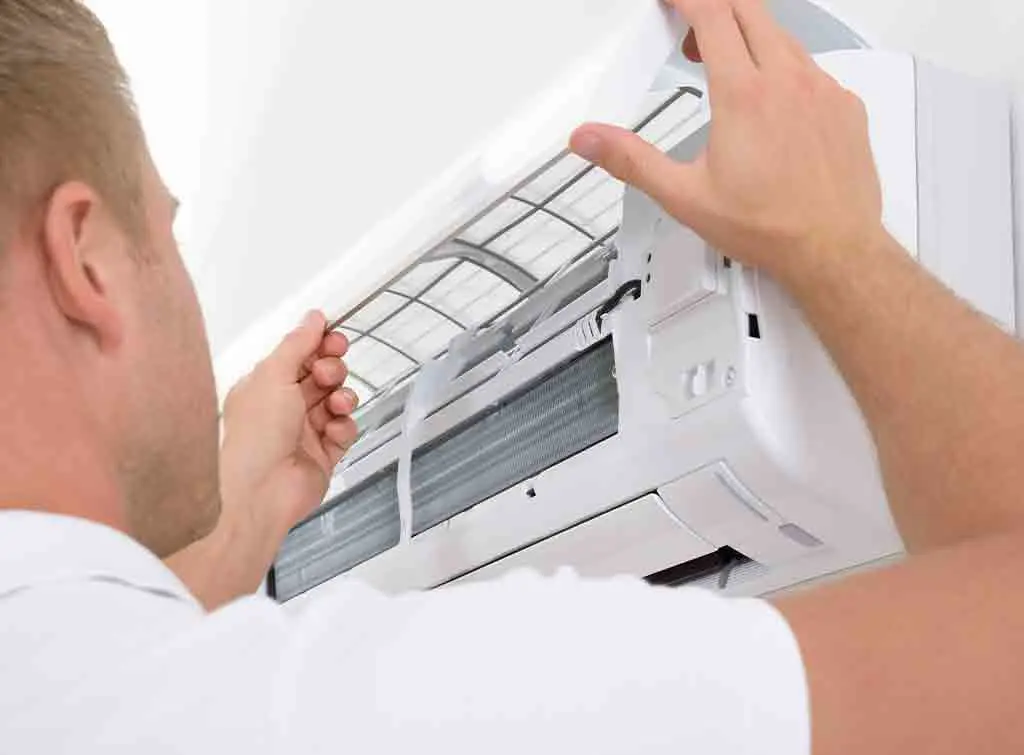
Types of air conditioning units
With a wide range of air conditioners to choose from, it is important to pick the best unit for your requirements.
You'll also need to choose the right capacity air conditioner for your home if you want it to be fixed in place, and whether you want it to cool one area or your entire house.
Depending on your needs, it may be easier to choose a portable air conditioner that can be transported to wherever you require it or to simply have it permanently in a particular room.
Fixed air conditioners can be mounted on your wall, floor or window. You can also choose an air conditioning unit with extra features, such as:
Dehumidifier function
Multiple fan speeds
Remote control
Timer
Night mode/noise reduction
Heating mode
Below are the two main types of air conditioning units:
Monoblock air conditioners
These are also known as single-unit, standalone or portable air conditioners. They plug into a mains power socket with a hose hanging out of a window or door.
This system does mean that there must be an open window/door to vent the hot air from.
They are not ideal for those who suffer from hay fever. And there will be some hot air that will come back into the property, making them less effective than fixed air conditioners.
Although, it is possible to buy a window sealing kit to block off the window gap.
This type of air conditioning unit is generally cheaper than split-unit air conditioners. They are easy to use as there is no installation required and being portable, they can be moved to the area where they are needed most.
Monoblock air conditioners are a great solution for the UK as, generally, the climate does not require cooling for more than three months a year. In cooler months the unit can be stored away, although they can be heavy to move.
Split air conditioners
These are also known as fixed air conditioners. They are comprised of an indoor unit (fixed to the inside of an exterior wall) and an outdoor unit (fixed on the other side of the wall or installed on the ground outside).
This is a great solution for a room that consistently gets very hot.
Split air conditioner units are fixed, so you can't move them to other rooms, or store them away in the winter. They're permanent fixtures and will need to be installed by a professional.
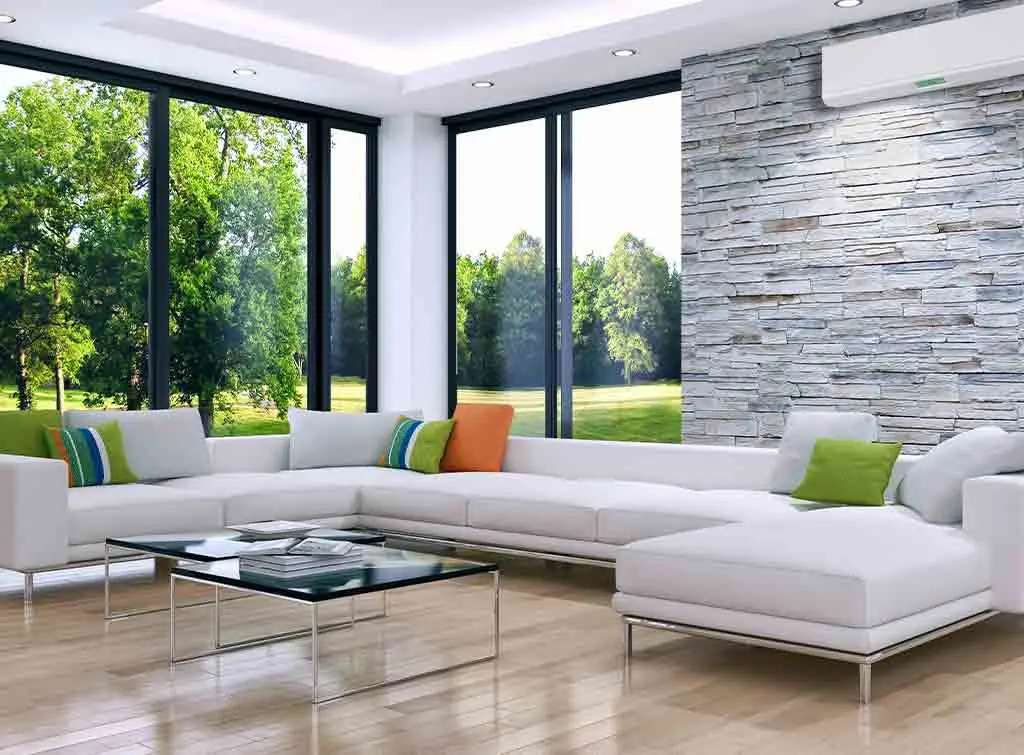
What size air conditioner do I need?
Once you have decided that an air conditioner is the perfect option for you, a common question we get asked is: "What size air conditioner do I need?"
This will mostly depend on the size of your home/room and whether you want to cool one space or the entire property. The larger the area you wish to cool, the larger the air conditioner you will need.
Air conditioners are often described in terms of their BTU (British thermal unit) output. The higher the BTU, the more efficiently it will cool a room.
In most cases, 5,000 to 8,000 BTUs is enough for most living rooms or bedrooms.
To work out what BTU is right for you, as a very rough guide, multiply the dimensions (in feet) of the room by five. So, for a room measuring 15 by 10 by 8 feet: 15 x 10 x 8 x 5 = an air conditioner of 6,000 BTUs.
How much does air conditioning cost to be installed by a professional?
On average, a 12000 BTU wall-mounted unit will cost £620 - £890, plus installation costs which will be around£910 - £1,310.
That said, the cost to install air conditioning in a house in the UK will depend greatly on the house itself and the type of air conditioning system you want to install.
If you’re opting for a split air conditioner unit, the labour cost will be around £960 - £1,380 per unit
The average ducted air conditioning cost is around £1,460 - £2,100for labour
To buy a 12000 BTU portable air conditioning unit, you're looking at around £350
If you need to know more about professional air conditioning fitting costs, check out our air conditioner installation cost guide for more prices.
See the tradespeople we've checked and recommend for your job
Contact or pay a trade through Checkatrade and you’re covered by our 12-month guarantee of up to £1,000*

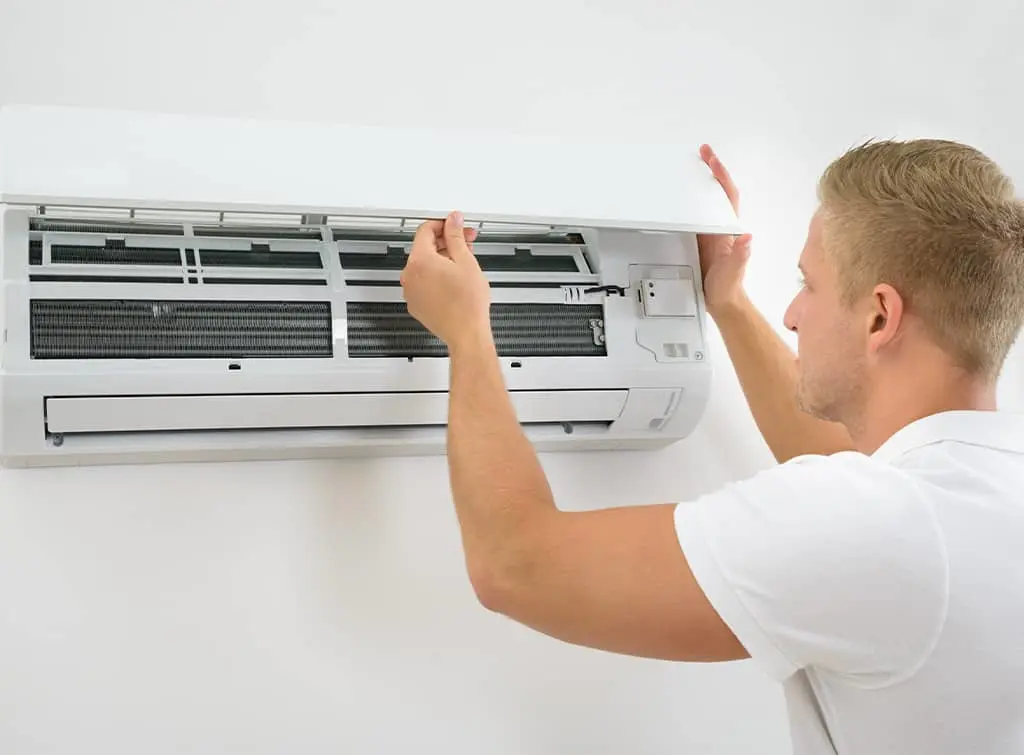
Find the best air conditioning experts near you
Investing in air conditioning for your property can keep you cool on the hottest of days and help to aid sleep no matter the outside temperature.
If you're ready to install an air conditioning unit, you're in the perfect place to find air conditioning installers near you...
See the tradespeople we've checked and recommend for your job

On Checkatrade, you'll only find trades who meet our high standards and pass up to 12 checks.
FAQs
Is it legal to install air conditioning in the UK?
Yes, it's perfectly legal to install air conditioning in the UK in both domestic and commercial properties. You'll just need to make sure that the installation complies with the relevant Building Regulations.
Depending on your property and where you live, you may need to get planning permission. That's particularly important if you live in a listed building or conservation area.
How hard is it to install an air conditioner?
Installing an air conditioner can be quite complex as it involves electrical work and often drilling through walls.
Unless you have the right skills and experience, we always recommend hiring a professional to install an air conditioner. They'll ensure the job is done safely and efficiently.
Where not to install an AC unit?
When installing an air conditioner, it's best to position the unit(s) in areas with good air circulation. So, away from any obstructions or corners of a room.
It's also a good idea to avoid units being near sources of heat, such as ovens or direct sunlight. They'll have to work harder if they're right by a heat source.
Does an aircon have to be on an external wall?
The most common installation for air conditioning will use units that are fixed to an external wall. That's because it allows for venting.
However, there are internal units available that use ducting to get rid of the hot air. These are attached to internal walls but are typically more expensive and complicated to install.
What do I need to know before installing AC?
Before installing air conditioning, there are several points to consider:
Where you want to position AC units
The size and power of the units
Noise level
Energy efficiency
Any planning permission or specific regulations that you might need to comply with in your area
How many hours does it take to install an air conditioner?
A standard installation of an air conditioner typically takes between 4 to 8 hours. That depends on the complexity of the job, access to the property, and the type of unit being installed.
What qualifications do you need to install air conditioning UK?
In the UK, air conditioning installers need to be F-Gas certified to prove they're qualified to handle refrigerants safely.
You'll often find that many installers also hold additional electrical and HVAC qualifications.
More Expert Advice Articles
See the tradespeople we've checked and recommend for your job

